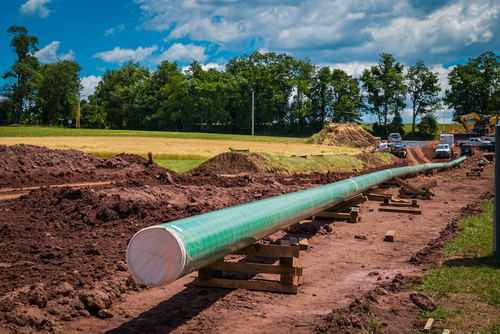
(Updates with statement from Williams)
The State of New York cited concerns over climate change and water quality for the denial of a pivotal certification for the Northeast Supply Enhancement Project (NESE), a 37-mile natural gas pipeline that includes a short segment in Lancaster County, Pa., and is designed to ship natural gas through New Jersey into the New York City region.
Williams had proposed the project to link New York City to Williams’ Transco pipeline system; however, the New York State Department of Environmental Conservation (NYSDEC) said May 15 it had denied the approval of the company’s application for a Water Quality Certification (WQC) that would have permitted the laying of pipe underwater. The agency said placing 23 miles of 26-inch pipe beneath New York Bay off Queens County would harm water quality by dredging up polluted seafloor sediment, and added that increased consumption of natural gas in New York would hamper the state’s effort to reduce overall fossil-fuel use and associated greenhouse gas (GHG) emissions.
Williams said in a statement that the company was disappointed with the denial of the project’s permits and that it was too early for a decision on whether the company would appeal.
“While we continue to believe in the fundamentals of this project, we will not refile in New Jersey or New York at this time,” the statement from Williams said. “The decision to pause this important infrastructure project is unfortunate for the region as the design and construction would have generated valuable economic activity in Pennsylvania, New Jersey and New York and would have directly and indirectly supported more than 3,000 jobs during the construction period.”
A natural gas industry advocate called the decision a capitulation by New York Gov. Andrew Cuomo to “extreme activists” and a “gut-punch to New York families, small businesses and manufacturers.”
“These job-creating pipeline projects, safely built by skilled union trades, provide the baseload power needed for renewable energy growth and are lifelines to economic opportunity, lower energy costs, and continued climate progress,” David Spigelmyer, president of the Marcellus Shale Coalition, said in a statement. “We appreciate Governor Wolf’s programmatic approach to ensuring Pennsylvania communities and families can realize the environmental and economic benefits of clean-burning, affordable natural gas.”
The NESE project calls for 10 miles of new 42-inch diameter pipeline along the main Transco line in Pennsylvania sending gas northeast into New Jersey. The overall project was designed to ship 400,000 dekatherms per day of incremental natural gas capacity – nearly 400 billion cubic feet of gas — to National Grid, which provides gas to customers in Brooklyn, Queens, and Long Island. Williams said the entire project would generate a total of around $327 million worth of GDP in the three states.
While National Grid pointed out that new gas would replace 900,000 barrels of fuel oil annually in New York, the NYSDEC said the emissions generated by the production of the additional gas outside New York would contribute to an overall GHG increase. The NYSDEC said the state’s Climate Act, which was enacted in 2019 while the WQC application was pending, requires New York to move away from fossil fuels and toward cleaner renewable sources. Along with concerns about GHG generated in the far-off Marcellus Shale formation, an increased supply of gas would also presumably slow New York’s transition to renewables.
Meanwhile, Pennsylvania gave natural gas a boost in the form of a $1.5 million grant to expand gas service to Luzerne County. The state’s Pipeline Investment Program (PIPE) matching grant will help fund more than 20,600 feet of pipeline to be installed in the community of Dupont Borough. The PIPE program helps pay for new final-mile natural gas connections to existing homes and businesses.
“The PIPE program provides a lifeline to residents and businesses across the commonwealth by helping them tap into Pennsylvania’s abundant natural gas resources,” Department of Community and Economic Development Secretary Dennis Davin said in a statement. “In the end, this assistance allows residents and business owners to save money, create jobs, and lower emissions.”